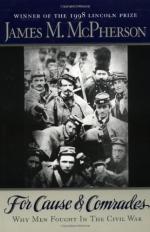
|
| Name: _________________________ | Period: ___________________ |
This test consists of 15 multiple choice questions and 5 short answer questions.
Multiple Choice Questions
1. While discussing differing interpretations of liberty from North and South, McPherson quotes a Texas cavalryman with Forrest who wrote that the issue was all BUT WHICH of these?
(a) Slavery.
(b) Subjugation.
(c) Elimination.
(d) Confiscation.
2. During the discussion of the desire to punish treason and "clean out" the rebels, a soldier from which state wrote his sister "I want to fight the rest of my life if necessary"?
(a) Michigan.
(b) Texas.
(c) Wisconsin.
(d) Illinois.
3. As "Chapter 7: On the Altar of My Country" begins, McPherson quotes an analysis of surviving Tennessee soldiers that showed they weren't really aware of the South's goals during the Civil War. Which decade was the analysis?
(a) 1910s.
(b) 1920s.
(c) 1890s.
(d) 1870s.
4. An Illinois cavalryman, who wrote a letter home on January 12, 1865, used the word "duty" how many times in a single sentence?
(a) 4.
(b) 8.
(c) 3.
(d) 5.
5. During the discussion of the Confederate response to the Emancipation Proclamation, what percentage of the sample 429 Confederate letters voiced pro-slavery arguments?
(a) 65%.
(b) 95%.
(c) 40%.
(d) 20%.
6. In the spring of 1862, soldiers from which state felt a redoubled commitment to the war effort when large portions of their home state fell to the "insolent invader"?
(a) Tennessee.
(b) Georgia.
(c) Maryland.
(d) Mississippi.
7. From which state was the private who wrote in January 1862, after speaking to a slave whose husband had been beaten, that he was convinced of the "cruelty and inhumanity of the system"?
(a) Louisiana.
(b) New York.
(c) Kentucky.
(d) Pennsylvania.
8. Which individual was one of the highest-ranking Jewish officials during the war, who denounced the Emancipation Proclamation to his wife in January 1863?
(a) Captain Clement L. Vallandigham.
(b) General James Vernon.
(c) Colonel Marcus Speigel.
(d) Private Chauncey Welton.
9. In the discussion of the psychological and physiological issues soldiers faced in 1864, modern studies have shown that a unit is exhausted if it twice suffers what fraction of casualties?
(a) 2/5.
(b) 3/5.
(c) 1/4.
(d) 1/3.
10. When talking about the frustrations of Union soldiers in the last two years of the war, what amount do readers learn drafted men could pay to acquire a substitute?
(a) $300.
(b) $50.
(c) $900.
(d) $150.
11. In the discussion of the Confederate ideal of white supremacy and the right to slavery, from which state was the soldier who wrote he was "fighting for our liberty against tyrants of the North...who are determined to destroy slavery"?
(a) Georgia.
(b) South Carolina.
(c) Kentucky.
(d) Virginia.
12. While talking about the Emancipation Proclamation's effect on Union morale, McPherson says that, in comparison to enlisted men, what percentage of officers supported emancipation?
(a) 78%.
(b) 44%.
(c) 25%.
(d) 89%.
13. When discussing the assertions of patriotism as a motivation for fighting, what percentage of the 429 Confederate letters and diaries used as sources affirmed this motivation?
(a) 27%.
(b) 66%.
(c) 84%.
(d) 43%.
14. When a sergeant in the 8th Georgia wrote to his family in 1863 that he would willingly sacrifice his life upon the altar of his country, readers learn that he did so in which battle?
(a) Gettysburg.
(b) Second Manassas.
(c) Bull Run.
(d) Shiloh.
15. A forty year old captain of the 18th Massachusetts wrote his wife in August 1862 that he'd rather fight for years than for his sons to continue it. In what battle was he killed four months later?
(a) Fredericksburg.
(b) Shiloh.
(c) Bull Run.
(d) Malvern Hill.
Short Answer Questions
1. During Stonewall Jackson's Shenandoah Valley campaign in 1862, some of his men fought five battles in addition to marching how many miles in a single month?
2. During the discussion of the hardships for soldiers' wives, how many married men does McPherson say voluntarily enlisted to fight the war?
3. During the discussion of the issues that arose from the Emancipation Proclamation, McPherson says that it sparked a moral crisis in the Union armies during the winter of what year(s)?
4. In 1863, a thirty-three year old private in the 2nd Ohio Cavalry wrote that his side must win, lest the march of Liberty be held back by all BUT WHICH of these?
5. On July 1, 1864, a captain for the 103rd Illinois wrote that it was day sixty-two for his regiment, and that they'd spent how many of those days under fire?
|
This section contains 632 words (approx. 3 pages at 300 words per page) |

|




